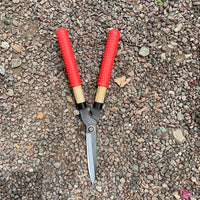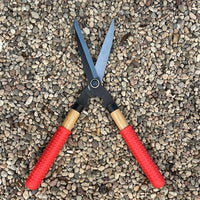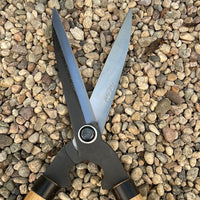


Niwaki Mini Shears
Niwaki Mini Shears
Mini Shears, for mini jobs. Great for tight spots and small scale topiary where you need a bit more control - and fab for grass edging. Nice red grippy rubber sleeves over the oak handles.
Keep them clean - dirty shears clog and the blades stick.
Most of our sharp tools are made from carbon steel - this means they will, through regular use, stain (and eventually rust) and gradually lose their edge. Caring for them involves three things…
1. Correct Use:
Japanese steel is hard and sharp, and can be more brittle than some people are used to - it will chip if abused
Do not cut wire, metal, stone, plastic or any other hard material (even bamboo fibres and some very hard woods, especially knots and burrs, can damage steel edges)
Do not twist or apply uneven pressure
Cut diagonally across branches (not straight across) so you cut along the fibres
Pay attention to our maximum cut dimensions, and don’t overdo it (shears are not loppers)
Use the base of the blades, not the tips, for heavier cuts
2. Keeping Them Clean:
Remove leaf resin, rust and gunk with a Crean Mate and water
Dry, wipe over with Camellia oil and store in a dry place
- 15 Ounces
- 14 x 5.6 x 1 inch
- 4.92" blades
- SK Stainless steel
- Japanese White Oak handles
- Made in Sanjo, Japan
- Includes Vinyl Sheath
This content type will accept rich text to help with adding styles and links to additional pages or content. Use this to add supplementary information to help your buyers.
You can use product metafields to assign content to this tab that is unique to an individual product. Use tabs to highlight unique features, sizing information, or other sales information.
Niwaki Mini Shears
Mini Shears, for mini jobs. Great for tight spots and small scale topiary where you need a bit more control - and fab for grass edging. Nice red grippy rubber sleeves over the oak handles.
Keep them clean - dirty shears clog and the blades stick.
Most of our sharp tools are made from carbon steel - this means they will, through regular use, stain (and eventually rust) and gradually lose their edge. Caring for them involves three things…
1. Correct Use:
Japanese steel is hard and sharp, and can be more brittle than some people are used to - it will chip if abused
Do not cut wire, metal, stone, plastic or any other hard material (even bamboo fibres and some very hard woods, especially knots and burrs, can damage steel edges)
Do not twist or apply uneven pressure
Cut diagonally across branches (not straight across) so you cut along the fibres
Pay attention to our maximum cut dimensions, and don’t overdo it (shears are not loppers)
Use the base of the blades, not the tips, for heavier cuts
2. Keeping Them Clean:
Remove leaf resin, rust and gunk with a Crean Mate and water
Dry, wipe over with Camellia oil and store in a dry place
- 15 Ounces
- 14 x 5.6 x 1 inch
- 4.92" blades
- SK Stainless steel
- Japanese White Oak handles
- Made in Sanjo, Japan
- Includes Vinyl Sheath



